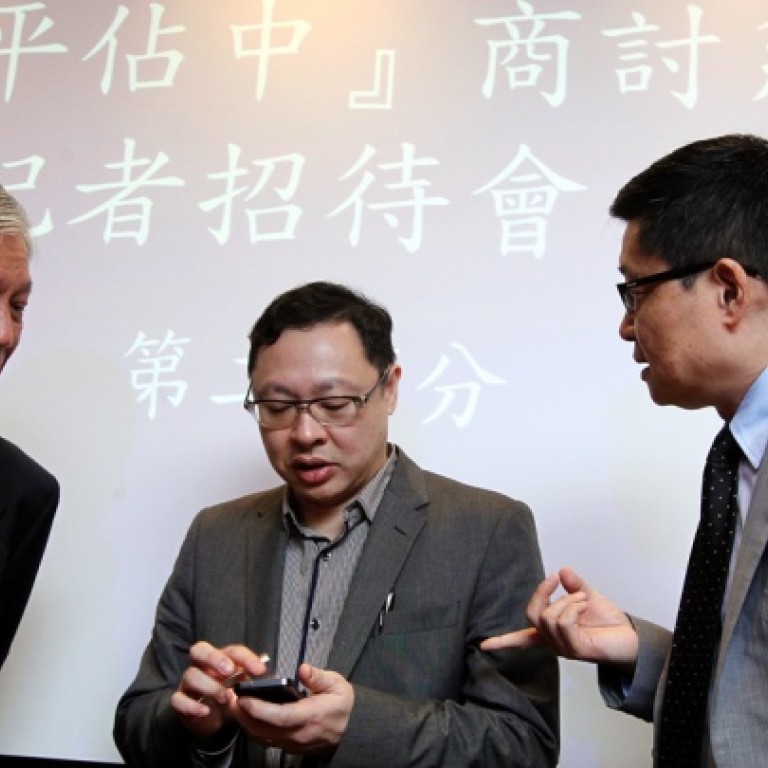
Occupy Central provocations won't help to build a consensus
Regina Ip says the movement, modelled after the spirit of the American original, will prove too provocative to ever achieve the organisers' purpose of building a consensus here
Hong Kong people who are quick to lambast mainlanders for copying and producing fake products should take a step back and look at their own talents in the counterfeit industry.
Nowhere is this more visible than in the political arena. Taking a leaf from "Occupy Wall Street", academics bent on holding Beijing's feet to the fire are organising an "Occupy Central" movement to pressure the central government to succumb to their demands for "true" democracy.
This movement is slated to comprise four stages - oath-taking by participants, holding of a series of "deliberation days", "citizens' authorisation" of the organisers' electoral proposals, and mobilisation of 10,000 participants to occupy Central in July next year.
To lend authenticity to their movement, organisers are claiming the "deliberation days" are modelled on the "deliberative polling" model pioneered by professors Bruce Ackerman and James Fishkin, two American academics, in 2002.
Yet Hong Kong's version of "deliberation days" follows the American model in name only. The success of the American programme is contingent on making an honest use of the modern science of public opinion polling, which involves scientific random sampling and designing survey questions aimed at capturing an accurate picture of public opinion.
By contrast, the first deliberation day slated to take place today will comprise 600 participants, including 500 supporters mobilised by the organisers and 100 selected at random. The sample size is clearly too small to enable the true state of public opinion to be gauged. As such, the first deliberation day is more likely to be staged as a propaganda event rather than an honest exercise in public opinion polling.
The American experience of polling in the 2012 presidential election shows that if pollsters are serious about making accurate predictions - as opposed to using polls to feign advantages or make self-fulfilling prophesies - no expense should be spared in constructing a scientific sample representative of likely voters.
In a recent postmortem examination of why its predictions about the 2012 presidential elections went wrong, Gallup pointed to the need for improvement in several areas, including ensuring that its base sample contains a better racial mix of likely voters. A token attempt at producing a random sample means the discussions are bound to be skewed.
In borrowing liberally from the West, organisers of Occupy Central also cite the doctrine of civil disobedience as justification for their calls to participants, including secondary school students, to defy the law.
In suggesting the regime is "illegitimate" and holding up the Basic Law to be the equivalent of an unjust law, they are being unnecessarily provocative to the authorities in Beijing, almost like waving a red flag at a bull. Beijing's displeasure at such confrontational tactics is apparent from the barrage of criticism of the Occupy Central movement made by pro-establishment figures from all conceivable professions and backgrounds, which have mushroomed recently in the pro-Beijing newspapers and .
Reasons are not hard to surmise: the Occupy Central rhetoric not only attacks the legitimacy of the Basic Law, it also sets up a politically unacceptable (in the eyes of Beijing) analogy with India's struggle for independence.
Is it really necessary for the organisers to go to such provocative lengths to force Beijing to respond? Have they calculated the risks and downsides of the mass occupation of Central district turning sour, triggering a violent confrontation and even the unleashing of the People's Liberation Army onto the scene? Or is that the real, covert purpose of the organisers - provoking a mini-Tiananmen incident in Hong Kong?
That would destroy "one country, two systems", and everything the Sino-British negotiators of Hong Kong's future before 1997, and advisers, drafters and implementers of the Basic law in the past 20-plus years, have tried hard to avoid.
There is no need to be overly pessimistic about the outcome of the impending consultations on Hong Kong's further constitutional development. Beijing is all too aware of the tremendous "governance dividends" that could be reaped once a consensus has been reached on the method for electing the chief executive by universal franchise in 2017, albeit within a birdcage - the confines of the Basic Law.
That would be a tremendous empowerment opportunity for the next, elected chief. It is unwise to overplay one's hand by adopting risky, illegal and unconstitutional means. The organisers should bear in mind that smart negotiators should never paint themselves into a corner and turn themselves into disloyal, anti-system opposition, thereby burning all bridges to the authorities.
Moreover, they should bear in mind that for the arrangements for electing the chief executive in 2017 to become a reality, a two-thirds majority vote in the legislature is necessary. To break the logjam, consultation and compromise are essential. Forget about Occupy Central - tackle Beijing by occupying the middle ground and go after a consensus among the people and in Legco.

